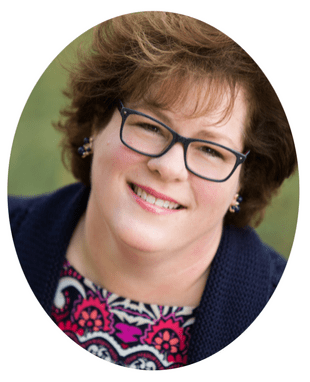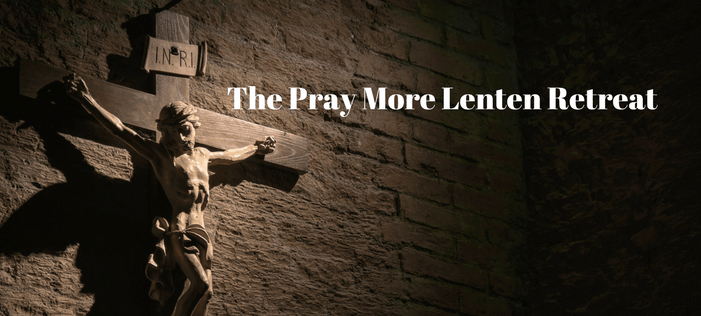Summary
Humility can sometimes be difficult to practice in our daily lives. In this talk, Mary discusses the importance to be humble and to stray away from the cycle of sin. She encourages us to take this season of Lent as an opportunity to go through the sacrament of reconciliation to be closer to the Lord.
Thank you for watching and participating in this retreat!
Not Registered, yet? Don’t miss the rest of the talks! Register for the Pray More Retreat!
Downloads
Audio MP3
Click here to download audio file.
Printable Study Guide PDF
Click here to download the printable study guide.
Printable Transcript PDF
Click here to download transcript of the video presentation.
“For it is love that I desire, not sacrifice, and knowledge of God rather than burnt offerings.”
Hos 6:6
Reflective Study Guide Questions
- Jesus suffered first to show us how to suffer well. What is Jesus teaching you about suffering right now? And about suffering well? How have you suffered poorly and how have you suffered well in the past?
- Is there a particular station, or two, that really resonates with something you need to reflect more on this Lent? How might God be speaking to you through that station? What might He be trying to communicate to you?
- Think of Veronica and the compassion she showed Jesus in his suffering. Who around you could use your compassion and tenderness during this season of Lent?
Text: The Call to Be Humble
Hi. My name is Mary Lenaburg. Welcome to the Pray More Novenas Lenten Retreat. Today, you and I are going to have a little discussion about humility, one of my favorite topics, as I’m sure it probably is yours as well. We’re going to talk about our call to be humble. We’re going to look at today’s readings of March 30th and we’re going to talk about the people of Israel, and how we are like the people of Israel – a stiff-necked people, who need our hearts reoriented toward the Lord. After all, isn’t that what Lent is all about? But first, we’re going to call upon the Holy Spirit and we’re going to pray. Shall we?
Come Holy Spirit
In the name of the Father, and the Son, and the Holy Spirit. Amen. Come, Holy Spirit. Fill the hearts of Your faithful. Enkindle in them the fire of Your love. Send forth Your spirit and they shall be created, and You shall renew the face of the earth. In the name of the Father, and the Son, and the Holy Spirit. Amen.
The Book of Hosea
So as we look at today’s readings, the first reading is from the book of Hosea. Now, the book of Hosea is God’s love story with the people of Israel. He has told Hosea to go and marry a woman of ill repute named Gomer. We are Gomer in this story, and God is Hosea, and He has asked Hosea to enter into covenant with her, as God has entered into covenant with the people of Israel. And so he does. He is obedient to the Lord and he enters into covenant with her, and all kinds of craziness and bad things happen: She’s unfaithful, she gets sold into slavery, she runs away from him, she does all kinds of things. And, always, Hosea is there, arms opened wide, door open. “Come home, come back, come love me, come be with me.” And she does for a time, and then she turns away again.
Again, it’s God’s love story with the people of Israel. It’s God’s love story with us. Isn’t that who we are, as people of sin? We turn our face from the Lord all the time. We choose to worship things other than God the Father. We choose our phone, we choose our job, we choose our family sometimes, and we put them in front of our worship of the Lord, instead of going to the Lord and asking for strength, and wisdom, and clarity, and how we are to carry out our vocation.
So, the first reading, there’s a beautiful scripture toward the end of the first reading. It’s Hosea 6:6, and it says For it is love that I desire, not sacrifice. And knowledge of God, rather than burnt offering. Because you see, my friends, this is what the Lord is asking of us. He is asking relationship. He is asking you to come into relationship with Him, so that you can get to know each other. So that you can know Him, and He can know you. Because you were created in His image and likeness, and His greatest desire is to be in relationship with you.
Understanding Humility
So here we are in the season of Lent, and it is a beautiful opportunity to enter into deeper relationship with our Lord. No matter what you have standing in-between you and God, no matter what sin is there, no matter what you’ve done, no matter what you’ve said, there is this beautiful sacrament we have within the church called confession, the sacrament of reconciliation, the sacrament of redemption and repair, that we can take all that we’ve done and all that we’ve said and bring it before the Lord and repair that relationship. That’s what humility looks like. Humility is us coming before the Lord and asking for forgiveness. Being truly sorry with a humble and contrite heart.
The Pharisee and The Tax Collector
It’s beautifully demonstrated in today’s gospel, where we have the Pharisee and the tax collector that come before the Lord in the temple, and the Pharisee is standing there saying “Ugh, I’m so glad I’m not like that dude over there, full of sin. I’m not like that lady over there, you know, full of debauchery. I am a thither, I have done everything You’ve asked me to do.” I mean, he comes before the Lord with this hubris, with this pride, all puffed up. “I have done it all, Lord.” He says. “I’ve checked off everything on the list. Of course You would love me.” And then over in the corner he sees the tax collector, and the tax collector doesn’t even fully come in. He’s so ashamed of what he’s done, he feels so unworthy before the Lord that he stands off to the side. And he beats his chest, and he says “God have mercy on me, a sinner. I have no right to even enter in. I am so unworthy.”
And what does Jesus say in this parable? He says “Who is the more righteous man? The tax collector, because he has entered into the temple with a humble and contrite heart.” He knows what he has done, he knows he is not worthy, and he offers all of that forward to the Lord, saying “Please forgive me. I offer this to You. I haven’t done it the way You told me to, I haven’t followed Your example, I have turned my head, like the people of Israel, away from the Lord. I have offered You burnt offerings, when what You asked, Lord, is my heart, my obedience, my fidelity. And I have not done that.”
And Jesus tells this parable of these 2 men to show us what it is to come before Him in humility and contriteness, which simply means “Lord, I am not worthy. I am not worthy. But I ask for Your forgiveness. I bring forward all of my sin, I bring forward all of the times I’ve told You no, all of the times I’ve turned my head from You, all of the times I’ve placed other in front of You, worship of You. I bring it all here, and I lay it at the foot of Your cross, and I ask for You to show mercy.” And as God showed the people of Israel mercy and forgiveness time and time and time again, He also shows us the same.
The Cycle of Sin
You see, we, like the people of Israel, get into a cycle of sin when we forget who we are, when we forget that we are children of God, when we forget that we are made in His image and likeness, and when we turn our face from Him and we begin to worship other. We enter into this cycle, and God calls us forth. First, there is sin, and then there is judgment from the Lord, because there’s always repercussion for our sin. Our sin does not remain with us. Sin is communal. When I sin against myself, I sin against community. When I receive the Lord’s mercy and grace and forgiveness, so does community. Which is why at the beginning of Mass we have that communal prayer, where we say “My brothers and sisters, I am sorry that I have offended you, and I ask for your forgiveness.” It’s a beautiful part of our liturgy.
So as the people of Israel enter into the cycle of sin, as you and I do, there is judgment, there is repercussion for what we have chosen to do. But what happens after that? There is always mercy. There is always our Lord standing, standing there, door open, saying “Come to Me, you and Me. Let’s sit down. Let’s talk to one another. You tell Me what’s wrong, and I’ll tell you how much I love you. You and I, we’re going to figure this out together. Let us walk in mercy and love together.” We have this beautiful 40 days of Lent, my brothers and sisters. 40 days to take a deeper walk with our Lord. 40 days to enter in. Whether you’ve done it well up onto this point or not, start today.
If there is something that is blocking you from the mercy of God, some sin, something that weighs heavily on your heart, bring it to the Lord. Go to confession, sit in prayer, bring it before the throne of God, and say “Lord, I’ve done this. I’m struggling with this. I don’t know what to do about this. Help me.” And allow the Lord to come and sit with you. Allow Him to show you His mercy and His love. For if you come humbly and say “Oh God, be merciful on me, a sinner,” it is amazing how merciful, and how loving, and how much freedom there is in that conversation. And when you come before Him in confession and you receive that absolution, you are able to stand up in freedom and to start again.
Start Today
So if you haven’t done the best Lent up until this point, I challenge you to start today. Come before the Lord and say “Have mercy on me, O God, a sinner,” so that He might show you mercy, grace, freedom, and love. Because remember, my brothers and sisters, all He asks from you is relationship. So take this opportunity to enter into that deeper walk with the Lord as we continue this walk toward Calvary, this walk toward the greatest moment in salvation history: The resurrection of our Lord, Jesus Christ, which allows all of us the beauty and freedom of eternal life with Him. Amen. Amen. Thank you so much for being with me today.
About Mary Lenaburg

Mary Lenaburg is a writer, speaker, wife and mother sharing her witness and testimony to groups of all ages about God’s Redeeming love and that faith is the courage to want what God wants for us, even if we cannot see where the path leads. Acceptance + Trust = Unimaginable Joy. Mary’s first book, “Be Brave in the Scared: How I Learned to Trust God During my Most Difficult Days” will be published by Ave Maria Press on May 10, 2019. It is available to order on Amazon, Barnes and Noble and wherever books are sold.
Mary and her husband have been happily married for 30 year, finding joy among the ashes having lost their disabled daughter Courtney in 2014. They live in Northern Virginia with their grown son Jonathan. She continues to embrace her father’s advice: “Never quit, never give up, never lose your faith. It’s the one reason you walk this earth. For God chose this time and place just for you, so make the most of it.”

